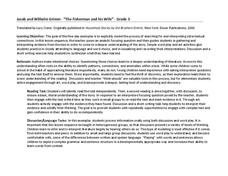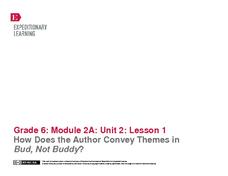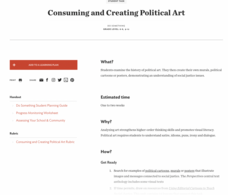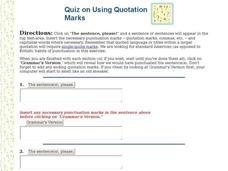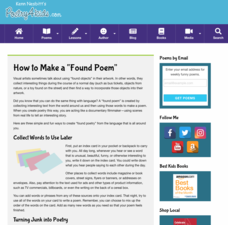Curated OER
Vocabulary in Conversation
In this online interactive worksheet, learners fill in 12 boxes with vocabulary words associated with different types of higher education degrees during conversations. Students check their answers online when completed.
Great Books Foundation
Discussion Guide for 1984
George Orwell's Nineteen Eighty-Four, published in 1949, can seem strangely prophetic when compared to modern news events and politics. Readers of Orwell's dystopian classic sharpen their critical thinking skills by engaging in a shared...
Curated OER
Writing Conversation: Using Quotation Marks
In this language arts worksheet, students learn to use quotation marks in written conversation. Students proofread 5 sentences and add the necessary punctuation. Then students write a conversation, starting a new line and indenting with...
Curated OER
From Quotation to Interpretation in Informational Texts
How to ignite thoughtful written responses with the words of philosophers, artists, and current events.
Curated OER
Using the Interactive Model to Explore an Authentic Written Text
Bring literature to your Spanish classroom! Small groups will read one of the selected texts from Cuentos De Eva Luna. After analyzing the text, learners will create mini-quizzes for their classmates and create a presentation discussing...
Curated OER
The Fisherman and His Wife
Engage conversation and explore the journey as you challenge young readers to interpret the german folktale, "The Fisherman and His Wife" written by literary brothers Jacob and Wilhelm Grimm.
Great Books Foundation
Discussion Guide for Handmaid's Tale
Great literature discussions are a consequence of carefully crafted questions, interpretative questions that permit more than one response, and responses supported by specific evidence from the text. The discussion questions in a guide...
EngageNY
How Does the Author Convey Themes in Bud, Not Buddy?
After reading up to chapter 12 of Bud, Not Buddy by Christopher Paul Curtis, scholars read chapter 13 and take part in a grand conversation about the author's writing techniques. Pupils discuss how his writing conveyed literary themes...
Curated OER
Developing Dialogue
Why do people argue? Use the article "A Holiday Medley, Off Key" to discuss the struggles that interfaith couples face when choosing to celebrate certain holidays. Then, in small groups, encourage learners to write dialogues that...
Apple State University
Friendly Letter Mini-Lesson
This mini-lesson plan about informal letter writing is packed with a lot of information about writing a friendly letter. Class members begin by working in pairs to answer questions after reviewing letter models. Then, take part in a...
California Education Partners
We Are The Ship
An assessment sheds light on scholars' ability to read, gather evidence, and draft an original written composition. Learners read an informative text twice before taking notes and discussing their thoughts and textual evidence with a...
The New York Times
Fiction or Nonfiction? Considering the Common Core's Emphasis on Informational Text
Nothing aids in comprehension more than an explanation and understanding of why things are done. Address why the Common Core requires the reading percentages that it established and analyze how this affects your readers. Learners read...
EngageNY
Pitching Your Claim with Best Evidence
Does Bud use his rules to survive or thrive? That is the driving question of a lesson plan following the reading of Bud, Not Buddy by Christopher Paul Curtis. In an argument essay prewriting activity, pupils use textual evidence to...
Teaching Tolerance
Consuming and Creating Political Art
A picture is worth a thousand words, but political art may be worth even more! After examining examples of political cartoons, murals, and other forms of public art, class members create their own pieces to reflect their ideals and...
John F. Kennedy Center
Comparing Cultural Holidays
A lesson plan examines the holidays, Día de los Muertos and Halloween. After an exciting clip from the movie Coco, class members review vocabulary and discuss what they know about Halloween. The conversation leads into the history of Día...
EngageNY
Close Reading of That Book Woman: How Did People Access Books in Rural Areas of the United States?
For this ninth lesson plan in a larger beginning-of-the-year unit, close reading skills are used independently to find the gist of the story That Book Woman. Rereading for important details is the targeted skill to unlock a deeper...
Curated OER
Quiz on Using Quotation Marks
In this quotation marks worksheet, students complete a 10 question on-line interactive quiz about the correct use of quotation marks. Students read the given sentence and type in all needed punctuation marks.
Reading Shakespeare
Shakespeare Literature Circles Role Sheets
Tired of those blank stares after your class reads a particularly complex passage from a Shakespearean play? Help high schoolers untangle that prose with a literature circle activity. Ten different roles prompt class members to focus on...
Poetry4kids
How to Create a “Found Poem”
Writers compose an original found poem by searching for words that inspire them. Words are taken from everyday conversation, books, cut from magazines, the mail, or an already written poem.
Curated OER
Generation TeXt
Students write sentences using different writing styles. Through peer editing, they hone their writing to create effective thesis statements. They create a glossary of text messaging terms.
University of North Carolina
Religious Studies
What is the difference between religion and religious studies? Readers find out after reading an online handout. It outlines common assignments in religious studies classes, such as critically evaluating religious texts and writing...
EngageNY
Analyzing Theme: The Invisibility of Captives during WWII
Can you see me now? Scholars discuss two definitions of invisibility and then connect the definitions to text evidence related to Louie's invisibility in Unbroken. Readers turn their attention to The Life of Miné Okubo and record text...
Curated OER
Mobile Phones
Why do we use phones? How does our language change on the phone? Learners practice phone conversations with the dialogues provided. They practice written phone dialogues with a partner, and create and perform phone conversations to...
Curated OER
What Happens in the First Nine Months?
Students explore human development using Internet resources that contain text, drawings, photos, and video about human development. They research a trimester of pregnancy then create drawings to show what is happening to the fetus during...







